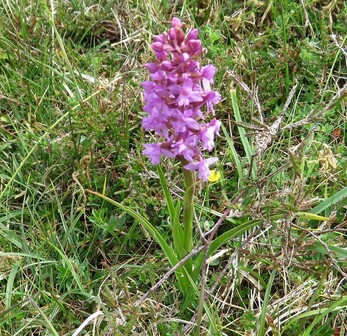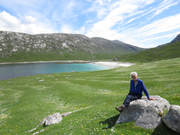 Fragrant orchid, gift of the seed-bank in a wild-flower lawn
Fragrant orchid, gift of the seed-bank in a wild-flower lawn Caribbean horticulture thrives in Bristol allotments and gardens. Traditions of saving seed, sowing beans and growing fruit trees. 'You get a great pleasure, especially when the rain falls, watching things grow/ says Mr Brown. Jamaican growers like he and Leon Walker bring with them a horticultural tradition of tending a small plot, skills being rediscovered during the lockdown. Both men convey the joy of growing food. And Leon Walker's wisdom is memorable..
It was refreshing to listen to these two Jamaican growers in a week when the headline news from Bristol was the toppling of Edward Colston's statue.
It was good to hear the sense of wonder in these Jamaican voices, their closeness to the earth, their tradition of saving seed, planting, growing, harvesting. Within the context of Seed Stories from Lockdown theirs was a story of self-reliance born of an understanding of our relationship with the soil and a reverence for it.
Right now radio schedules come close to being overwhelmed with items on Covid 19. And the violence erupting around the Black Lives Matter protests. Of the latter, I'd like a more balanced picture. And if we are to hear the history let it not be partial. The whole truth in its historical context please.
I doubt whether the Radio Times will publish two of my letters in consecutive weeks- but I had to write it. So here it is.
Planting Seeds
Seed Stories from the Lockdown (The Food Programme Radio 4 . 14 June) )
There’s a cameo of Jamaican growers in Bristol. Mr Brown on his allotment, plants kidney bean seeds he saves ‘ you get a great pleasure from watching things grow.’ Leon Walker has a garden of fruit trees; cherry, plum, apple. ‘ everything comes from the soil, we depend on that.’ These men have skills to share, horticultural skills brought from the Caribbean and taking root in Bristol.
Their voices give a sense of balance as Colston’s statue is toppled and drowned in Bristol Harbour. In the Black Lives Matter debate, where peaceful protest is hijacked by violence, it would be good to hear more voices like Mr Brown and Leon Walker, their wisdom and sense of wonder.
I recommend this edition on The Food Programme. Seed stories from Lockdown is an important topic.
Having lived in Bristol for many years I'm following David Olusoga's ' A House Through Time..' Number 10 Guinea Street, so called because the Bristol merchant who built the house made his money by bringing slaves from Guinea, West Africa. I wish the origins of the slave trade in Bristol had been made clear. Historical truth demands it. When Bristol merchants arrived in Guinea did they buy slaves already captured by other African tribes? Were they profiting from an established trade in slaves? It does not exculpate them but it changes the story.
Globally, slavery goes back a long way, long before the Bristol Triangle. And it's still with us in modern day trafficking.
This evening, BBC4 showed Black and British: a forgotten history . Here David Olusoga explores his subject in more depth and detail. Fascinating insights into Tudor England's outreach into Africa. Seeing an Asante king adorned in Ghanaian gold ( Guinea is now named Ghana) I realised the origin of the coin, the golden guinea. The coin was minted in Britain between 1663-1814, with gold from the coast of West Africa. .

 RSS Feed
RSS Feed